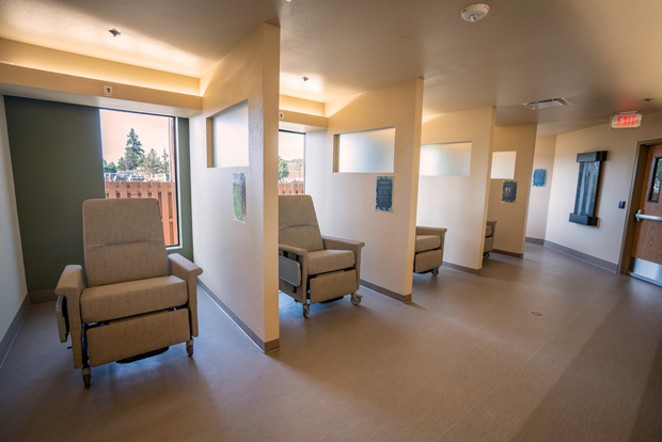It's a Tuesday evening and Nicole Von Laven, a behavioral health specialist with Deschutes County's Mobile Crisis Assessment Team, answers a phone call from Bend Police Sgt. Elizabeth Lawrence that the veteran officer placed to the county's mental health crisis hotline.
Lawrence tells Von Laven she's at the home of a family whose adult son is experiencing a mental break that, as far as they know, is happening for the first time. Lawrence told Von Laven the subject is agitated, loudly arguing with himself and pacing around the backyard and sweating, although the temperature on this night is in the high 20s. Lawrence said the man is not threatening to harm himself or others. His father says there are no firearms or intentional weapons in the home, she relates, but the man is not responding to anyone.
Once Von Laven arrives, Lawrence steps back and allows the MCAT specialist to use what she calls a "calm, authentic approach," letting the man know that she's a mental health professional who is there to understand what created this moment of crisis and what steps can be taken to best support himself and his family.
It's a scene that Oregon lawmakers want routinely occurring throughout the state: Police officers respond to a mental health crisis to secure the scene, assess whether a safety threat exists and then allow a mental health professional to intervene. Right now, a bill being heard by the House Committee on Behavioral Health would help make it a reality.
House Bill 2417, introduced into the 2021 Oregon Legislative Assembly by a handful of co-sponsors, including Senate Majority Leader Rob Wagner (D-Lake Oswego), would allot $10 million for the Department of Human Services to provide the state's 241 cities and 36 counties with 50% matching grants of up to $300,000 to create mobile mental health crisis intervention teams and ancillary services.
Cities and counties, in order to qualify for a grant, would be required to have one sobering facility and one shelter for every 65,000 residents, and at least one crisis respite space like the Deschutes County Stabilization Center, where people receive short-term mental health care. Scott Winkles, a lobbyist with the League of Oregon Cities, said the language of the bill is likely to change as it moves through the legislature because many of Oregon's smaller cities and counties are sparsely populated.
"For instance, I don't think anybody really wants to keep in the requirements for one sobering facility for every 65,000 residents," Winkles said.
Rep. Paul Evans (D-Monmouth) submitted written testimony that says the practice of using police officers to respond to a mental health crisis makes no practical sense. And Lawrence, who is in charge of Bend PD's community response unit, says her team receives "five or six calls a day" about someone experiencing a mental health crisis. That's between 1,825 and 2,190 calls in Bend per year.

"Increasingly, (Oregonians) are hesitant of law enforcement to deal with situations because of fear of escalation," Evans wrote. "Furthermore, we are putting our local law enforcement agencies in impossible situations, tasking them with responding to mental health-related calls they are not adequately trained to resolve while removing them from more pressing enforcement issues. We cannot expect law enforcement to act as social workers when actual social workers would be better suited to the task."
The White Bird model
Although MCAT has been operating for 17 years, it's the Eugene White Bird Clinic's program, CAHOOTS (Crisis Assistance Helping Out on the Streets), which is very similar to MCAT, that HB 2417 uses as its model for cities and counties to follow.
Holly Harris, program manager of the Deschutes County Stabilization Center, said "the intent of HB 2417 is really good," but that the CAHOOTS model, which requires a nurse or paramedic to accompany mental health professionals to each crisis call, is not necessary or practical for every Oregon city and county.
Hopes for the future if HB 2417 passes include having 911 operators trained to quickly assess a situation and directly dispatch a mobile crisis intervention team rather than sending the police, who most often respond to calls as a criminal matter.

"We're dipping our toes into the water with this, for instance, looking at subject calls where a person or a friend says someone is experiencing thoughts of suicide, but they have not made any attempt to harm themselves and they do not have any weapons—those calls would go to a clinician," Harris said. "What we've learned in our 17 years of doing this in Deschutes County is that a lot of calls can be handled on the phone by a clinician."
Von Laven provides the example of an individual with a severe diagnosis of schizophrenia who typically is not dangerous—but contributing factors increase the likelihood of that person harming an MCAT responder.
"For example, the presence of law enforcement with weapons feels more threatening than a therapist or a case manager responding," she said. "I know from working so closely with law enforcement that they also think MCAT responding directly to some calls would be helpful. It's not necessarily just a perspective of the mental health field. It's a partnership and as a community, we all are trying to find ways to help meet the needs of people in crisis and to benefit them without sacrificing the safety of MCAT (workers). We want everyone in the community feeling as safe and as free as possible."
If you or anyone you know is experiencing thoughts of suicide, or of harming yourself or others, call the Deschutes County Crisis Line at 1-800-875-7364.






















